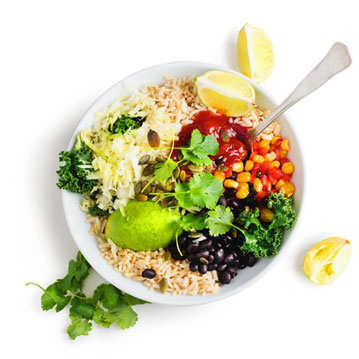A 39-year-old man who works in the IT sector in Bengaluru and adheres to a “Jain diet” was doing well until one day when he began experiencing chest pain. Following some bloodwork, his doctor determined that he had high cholesterol and type 2 diabetes. His illness was suspected to be genetic, given his strong family history. His doctor gave him prescriptions for three different drugs for the rest of his life. Before starting his medications, he consulted me to explore if there were any dietary and lifestyle changes that could be able to treat or reverse his illness. I introduced him to a Jain whole food plant-based diet (WFPBD). His entire blood work became absolutely normal in just 12 weeks! Without using any medications, his diabetes and high cholesterol had been cured! His doctor was also amazed. He is still following this diet to prevent the recurrence of these diseases. A WFPBD best aligns with the most important Jain principle – Ahimsa and is an excellent choice for maintaining good health and promoting a sustainable lifestyle. A WFPBD is a way of eating that emphasizes whole, minimally processed plant foods, which include whole grains, fruits, vegetables, legumes/pulses/beans, nuts, and seeds while excluding animal products (milk, eggs, fish, and meats), refined grains, salt, added sugars, oil, and processed foods.
Modern health science and Jainism are closely related. Jain scriptures recommend abstinence from certain categories of foods known as “Mahavigai” and “Vigai.” “Mahavigai” includes honey, meat (including eggs and fish), butter, and alcohol. Consumption of these foods incurs tremendous violence. “Vigai” includes milk, curd, ghee, oil, jaggery/sugar, and fried food. These foods stimulate our senses and lead to passionate thoughts. Both of these categories of foods are detrimental to your health and spiritual development. Jains abstain from honey, meat, and alcohol. However, milk and milk products like tea, butter, ghee, curd, paneer, sweets, etc. are a major part of our daily diet. Also, meals are considered incomplete without the addition of oily, sugary, and fried foods. Hence, despite following the “Jain diet,” many nevertheless suffer from a number of illnesses such as heart disease, obesity, high blood pressure, high cholesterol, allergies, autoimmune diseases, cancers, mental health issues, and so on and so forth.
The Jain doctrine, preached by our Tirthankaras, advises a Jain diet that is meant to keep us healthy and disease-free for our spiritual progress. Then, why does it seem paradoxical that a high percentage of Jains who adhere to a strict “Jain diet” are prone to illnesses? It is because of the misinterpretation of the definition of the term “Jain diet” in modern times. Let us examine the reasons why milk (from other mammals) is harmful to our health:
Harmful effects of dairy (milk and milk products):
- Excess Hormones: Milk products contain various hormones that are naturally produced by lactating mothers – cows, buffaloes, etc. Additionally, mistreatment of these animals leads to the release of stress hormones called cortisol, into the milk. Furthermore, growth hormones are injected into animals for increased milk production at many dairy farms. All these hormones are harmful and toxic to humans and have been linked to serious and deadly diseases as follows:
- Cancer Risks – Increased risk of breast and ovarian cancer in women, and prostate cancer in men.
- Gastrointestinal problems – Abdominal cramps, bloating, flatulence, acid reflux, food allergies, and inflammation.
- Menstrual problems – Early puberty, painful and irregular menstrual cycles, endometriosis, PCOD, infertility, etc.
- Risk of Obesity and Type 2 Diabetes – These can lead to many serious complications in our body for all age groups.
- Antibiotic Resistance: Milk and milk products also contain antibiotics that are used to prevent diseases in cows and buffaloes. As a result, rising antibiotic resistance in humans, making it difficult to treat infections with antibiotics.
- Saturated Fat: The majority of milk products have significant levels of saturated fat, which lead to blocked arteries and increased risk of stroke, heart disease, high cholesterol, and other chronic illnesses. This is also a significant contributor to diseases like diabetes, obesity, and Alzheimer’s.
- Trimethylamine N-oxide (TMAO): TMAO is a compound that is produced when the body digests certain types of substances like eggs and milk products. High levels of TMAO in the blood are associated with negative health effects such as doubling the risk of cardiovascular disease, impaired kidney function, increased risk of cancer, etc.
As per cardiologist Dr. Kim Williams, former president of American College of Cardiology(ACC), this relationship with TMAO is the reason enough to quit dairy completely!
- Allergies and Inflammation: Milk products contain proteins (arachidonic acids) that can trigger allergies and inflammation, leading to symptoms such as rhinitis, eczema, asthma, and arthritis.
We have long been told that milk and milk products are crucial for our growth, development, and overall health. We were also told that it contains vital nutrients, and it is important to consume them. Even many doctors recommend them. But modern scientific research has busted all these myths. Here are some myths and truths about dairy products:
Myth #1: Cows produce B12.
Cows’ gut contains microorganisms that come from soil that the animal ate while grazing. These microorganisms synthesize vitamin B12 by a fermentation process. However, the amount found in milk is not significant, and therefore, B12-fortified feed or B12 supplements are given to cows by dairy farmers. Therefore, instead of consuming milk, we should directly take plant based B12 supplements.
Myth #2: Milk is an excellent source of calcium for strong bones.
Although dairy products are often promoted as a source of calcium for strong bones, studies have shown that high dairy intake can actually increase the risk of osteoporosis (weak bones) and fractures. Our daily calcium requirements can be easily met by eating green vegetables, seeds, nuts, and whole grains.
Myth #3: Milk is a good source of protein.
Milk and milk products do have protein; however, studies have shown that eating animal protein has negative health consequences such as increased growth hormone, free radicals that accelerate ageing, cancer mutations, high LDL cholesterol, and raised blood sugar. Simultaneously, we lose protective natural killer cells and DNA repair mechanism, which leads to increased risk of cancer, heart disease, and diabetes.
In India and around the world, the modern dairy industry is plagued by serious health problems, issues of violence and animal mistreatment, and environmental exploitation. Several people (including non-Jains) have chosen non-violent plant-based dairy substitutes as a result of the above problems.
Vegan diet: healthful or harmful?
Jains who have given up milk and milk products are following a vegan lifestyle. However, it is important to note that a healthy life is not necessarily guaranteed by being a vegan unless you watch what you are eating. Since vegan eating options might be healthful or harmful.
- Harmful vegan food:
Processed foods that contain oil, refined sugar, salt, refined flour, polished rice or other grains, preservatives, additives, emulsifiers, or stabilizers and “flavors” are low in nutrients. Such unhealthy vegan foods can contribute to several similar chronic diseases, as seen earlier with milk products. - Healthful vegan food:
Whole foods plant-based diet (WFPBD), wherein you consume unprocessed whole foods such as fruits, vegetables, whole grains, lentils, beans, pulses, seeds, nuts, and natural spices, as well as beverages such as unprocessed green tea, coconut water, and vegetable juices, to maintain a healthy and balanced diet. Here are some benefits of consuming WFPBD or healthful vegan food:- Rich in Nutrients: It is naturally rich in a variety of vitamins, minerals, essential nutrients, and phytonutrients that are crucial for overall health.
- Low in Saturated Fat and Cholesterol: It is naturally low in harmful saturated fat and cholesterol.
- High in Fiber: It is rich in fiber, which can help regulate digestion, remove toxins, nourish your gut lining, help grow a healthy microbiome in the gut and reverse the majority of chronic illnesses.
- Weight Management: It can help with weight management because it is generally lower in calories and higher in fiber than a typical modern diet.
- Environmental Sustainability: It is more environmentally sustainable than a diet that includes animal-based foods. Plant-based foods require less water, land, and other resources to produce than animal-based foods.



